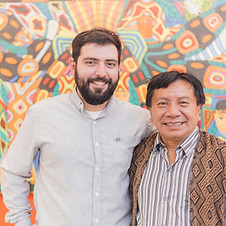Round table :
Art and Territorial Recovery

Image : A tela e a terra (The canvas is land), 2018, by Amilton Mattos. Photograph of MAHKU Independent Center : a place for research, artistic experimentation and the preservation of the forest and of Huni Kuin knowledge.
Saturday, September 3, 2022, 3:30 pm
In person at SBC Gallery of Contemporary Art
The round table aims to put in dialogue different Indigenous artistic perspectives that address the issue of autonomy and territorial recovery through art. Ibã Huni Kuin and Kássia Borges, members of the MAHKU collective (Huni Kuin Artists Movement), Daniel Dinato, co-curator of the exhibition Vende tela, compra terra, Mike Patten, artist and curator of the 2022 Biennial of Contemporary Indigenous Art entitled Land Back, and Jean-Philippe Uzel, professor of art history at the University of Quebec in Montreal, will be present.
This round table is part of the symposium "North-South Confluences: Cosmopolitics and Indigenous Territorialities in Quebec and the Brazilian Amazon" organized by the Department of Religious Sciences of the University of Quebec in Montreal and will precede the opening of the exhibition Vende tela, compra terra (sell the canvas, buy land), entirely devoted to the production of MAHKU, at the SBC Gallery of Contemporary Art.




Ibã Huni Kuin
Ibã Huni Kuin (1964) is an artist, researcher and txana, an expert of the chants. During the 1980s, he began research with his father, Tuin and his uncles to revive the Huni Kuin’s language, hanxta kuin and the huni meka chants. In 2012, from this framework, he funded MAHKU with his son Bane.
Ibã is also an activist fighting for reinforcement of Huni Kuin’s political and economical autonomy as well as their cultural affirmation. These politics of affirmation involve a strategy of alliances not only between other Indigenous populations but also with txai, non-Indigenous allies. Collaborating with Daniel Dinato, Ibã Huni Kuin came up with the idea of curating an exhibition outside of the Brazilian borders, offering his community a chance to forge new ties.
Daniel Dinato
Daniel Dinato (1990) studied both social anthropology and curatorial studies and has been researching and collaborating alongside MAHKU since 2016. Since then, he developed a close bond with artists of the collective, especially Ibã with whom he created the exhibition Venda tela, compra terra. Currently a PhD student at the University of Quebec in Montreal, he has been developing with MAHKU the concept of curator-txai, a long-term curatorial practice based on affinities and difference.
Dinato is a member of the Interuniversity Center for Indigenous studies and research (CIÉRA), the Interdisciplinary Research Group on Contemporary Indigenous Assertions (GRIAAC) and the Núcleo de Antropologia das Sociedades Indígenas e Tradicionais (NIT-UFRGS).
Kássia Borges
Kássia Valéria de Oliveira Borges, of the Karajá (Iny) people is a visual artist, curator and professor at the fine arts program of the Federal University of Uberlândia (UFU). She holds a PhD in Environmental Sciences from the Federal University of Amazonas (2017), entitled "Women Ceramists of Mocambo: The Art of Living Environmental Artifacts", and a Masters in Visual Arts from the Federal University of Rio Grande do Sul (2003), entitled "Origin: A Principle to Find". Since the 1980s, she had been involved in Brazil’s indigenous people's fights for rights and recognition.
Michael Patten
Michael Patten is a contemporary visual artist based in Montreal and a member of the Zagime Anishinabek First Nation in Saskatchewan. He holds a B.F.A. in painting and a B.F.A. in drawing with a minor in art history from the University of Regina and he has participated in solo and group exhibitions internationally and nationally in museums, artist run centers, commercial spaces, and university galleries. In 2017, he was one of the Laureates for the Hnatyshyn Foundation‘s REVEAL- Indigenous Art Awards. And he is presently the Director of the Contemporary Native Art Biennial in Montreal – a nonprofit organization with a mandate to recognize and support contemporary Indigenous art and artists.
Jean-Philippe Uzel
Jean-Philippe Uzel is an art history professor at the University of Quebec at Montreal. His expertise focuses on modern and contemporary art history and theory, more precisely the relationship between art and politics. For the last 20 years, Uzel has been interested in North American indigenous contemporary art. He is currently working on the development of a MOOC, an online class open to all people, called Ohtehra’, l’art autochtone aujourd’hui , opening in october 2022. He is a member of the Interdisciplinary Research Group on Contemporary Indigenous Assertions (GRIAAC) and of the Interuniversity Center for Indigenous studies and research (CIÉRA).
IN PARTNERSHIP WITH


